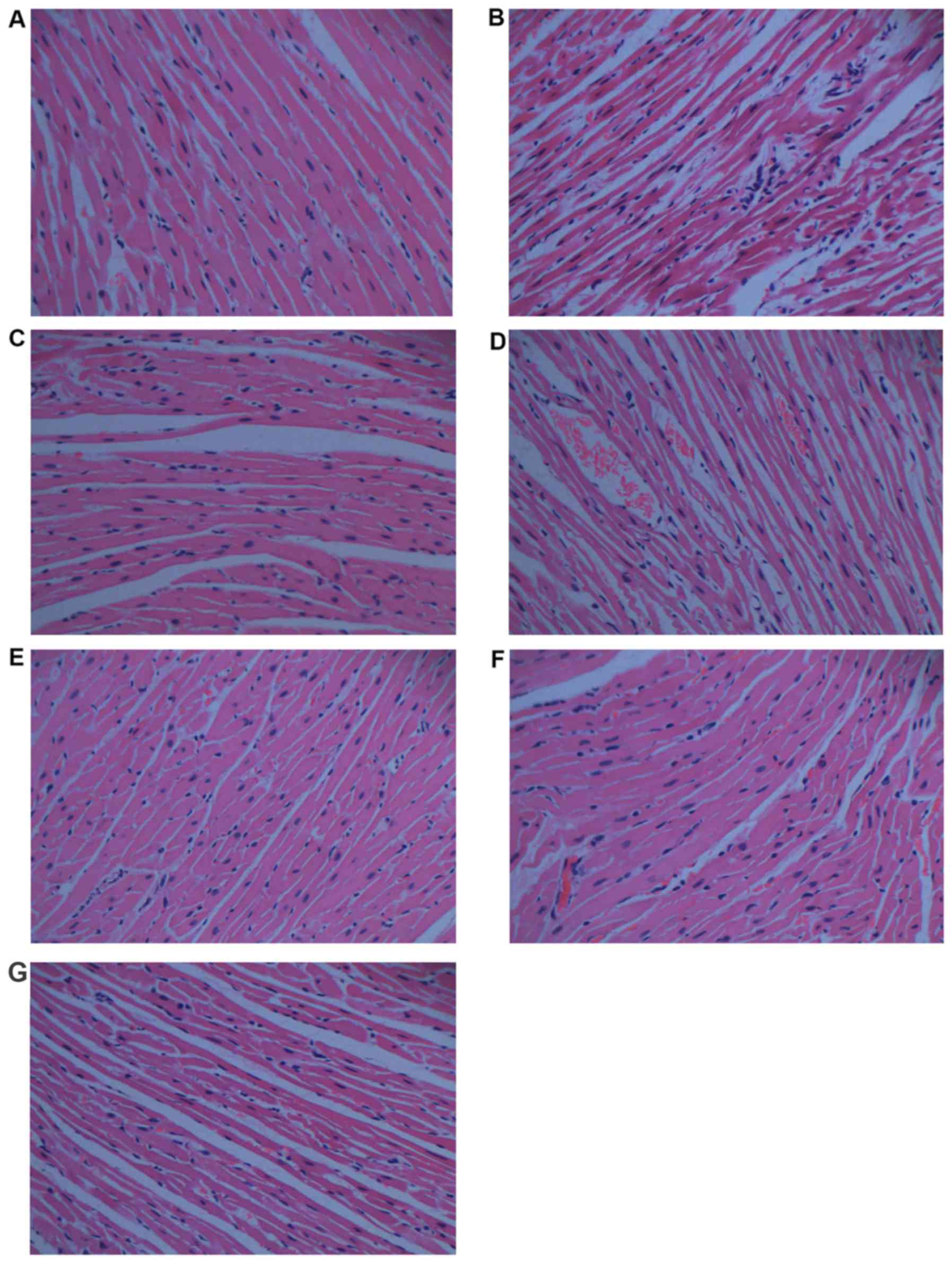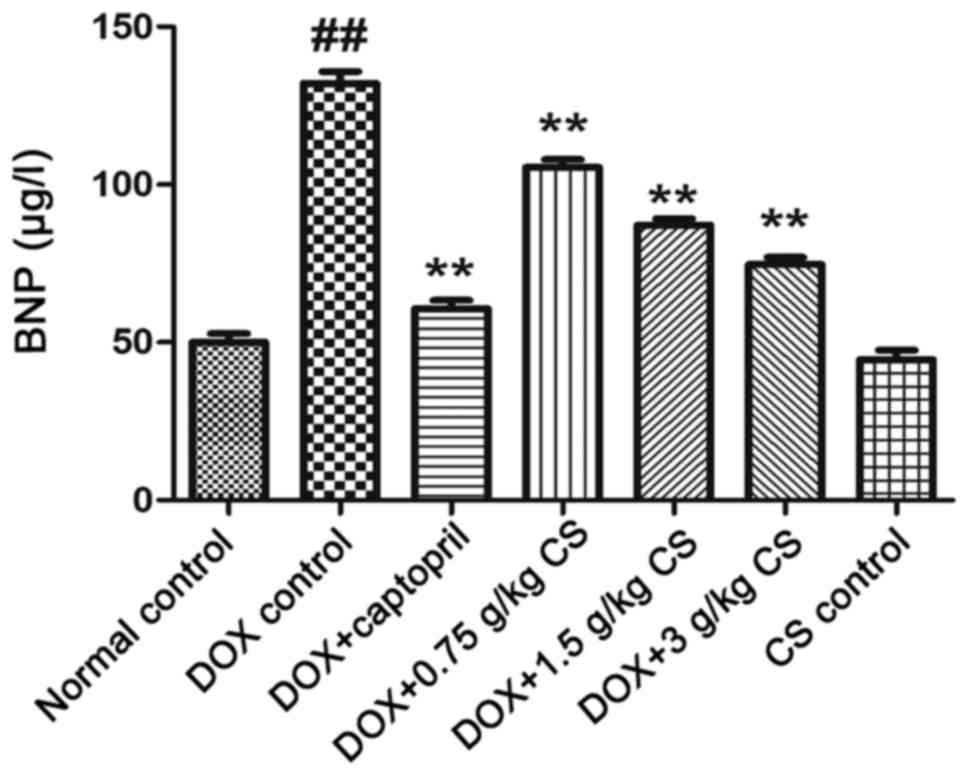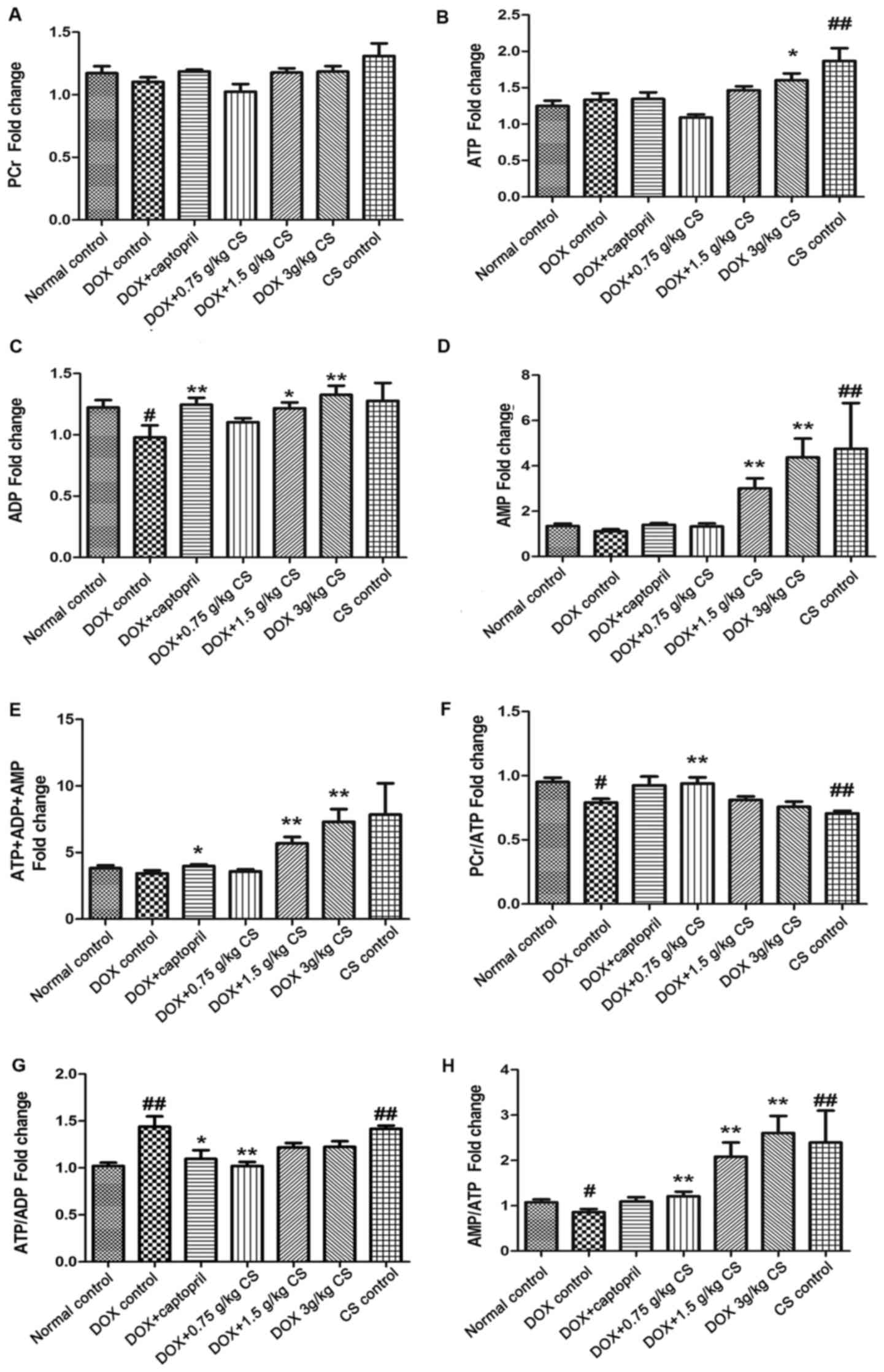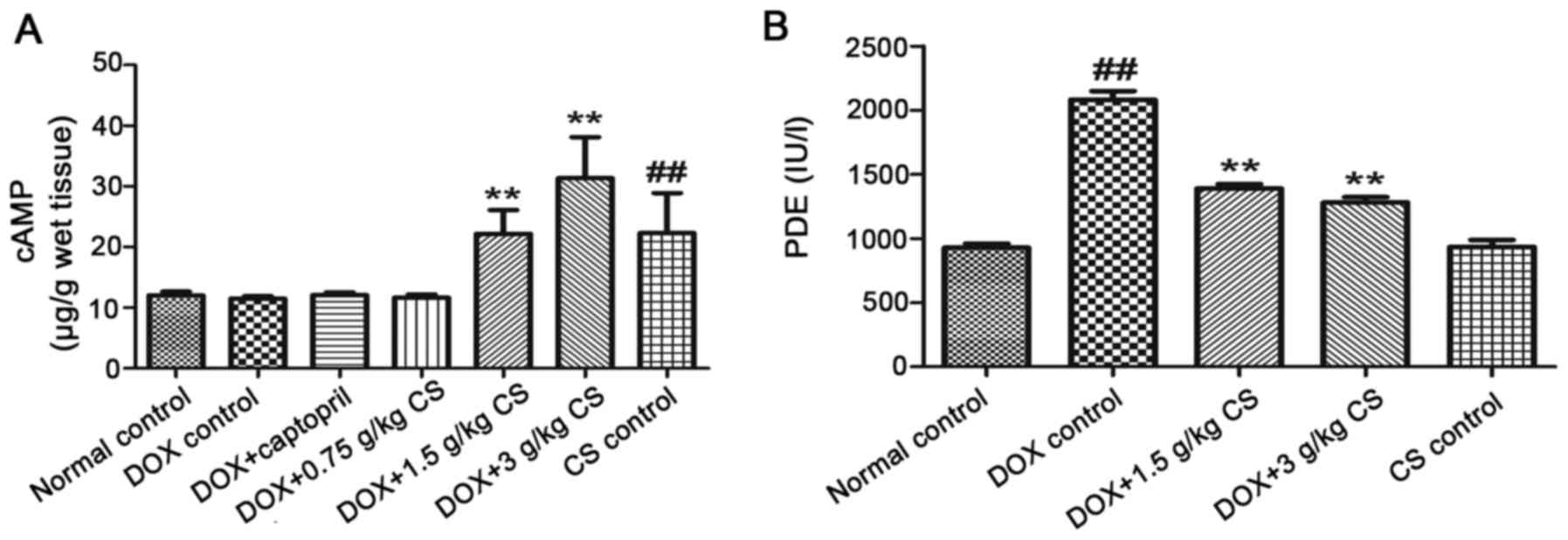|
1
|
Octavia Y, Tocchetti CG, Gabrielson KL,
Janssens S, Crijns HJ and Moens AL: Doxorubicin-induced
cardiomyopathy: From molecular mechanisms to therapeutic
strategies. J Mol Cell Cardiol. 52:1213–1225. 2012. View Article : Google Scholar : PubMed/NCBI
|
|
2
|
Carvalho C, Santos RX, Cardoso S, Correia
S, Oliveira PJ, Santos MS and Moreira PI: Doxorubicin: The good,
the bad and the ugly effect. Curr Med Chem. 16:3267–3285. 2009.
View Article : Google Scholar : PubMed/NCBI
|
|
3
|
Parker MA, King V and Howard KP: Nuclear
magnetic resonance study of doxorubicin binding to cardiolipin
containing magnetically oriented phospholipid bilayers. Biochim
Biophys Acta. 1514:206–216. 2001. View Article : Google Scholar : PubMed/NCBI
|
|
4
|
Wu R, Gao JP, Wang HL, Gao Y, Wu Q and Cui
XH: Effects of fermented Cordyceps sinensis on oxidative stress in
doxorubicin treated rats. Pharmacogn Mag. 11:724–731. 2015.
View Article : Google Scholar : PubMed/NCBI
|
|
5
|
Tokarska-Schlattner M, Wallimann T and
Schlattner U: Alterations in myocardial energy metabolism induced
by the anti-cancer drug doxorubicin. C R Biol. 329:657–668. 2006.
View Article : Google Scholar : PubMed/NCBI
|
|
6
|
Lebrecht D, Setzer B, Ketelsen UP,
Haberstroh J and Walker UA: Time-dependent and tissue-specific
accumulation of mtDNA and respiratory chain defects in chronic
doxorubicin cardiomyopathy. Circulation. 108:2423–2429. 2003.
View Article : Google Scholar : PubMed/NCBI
|
|
7
|
Li SP, Li P, Lai CM, Gong YX, Kan KK, Dong
TT, Tsim KW and Wang YT: Simultaneous determination of ergosterol,
nucleosides and their bases from natural and cultured Cordyceps by
pressurised liquid extraction and high-performance liquid
chromatography. J Chromatogr A. 1036:239–243. 2004. View Article : Google Scholar : PubMed/NCBI
|
|
8
|
Zhu JS, Halpern GM and Jones K: The
scientific rediscovery of an ancient Chinese herbal medicine:
Cordyceps sinensis: Part I. J Altern Complement Med. 4:289–303.
1998. View Article : Google Scholar : PubMed/NCBI
|
|
9
|
Lo HC, Hsu TH, Tu ST and Lin KC:
Anti-hyperglycemic activity of natural and fermented Cordyceps
sinensis in rats with diabetes induced by nicotinamide and
streptozotocin. Am J Chin Med. 34:819–832. 2006. View Article : Google Scholar : PubMed/NCBI
|
|
10
|
Ji J, Liu J, Liu H and Wang Y: Effects of
fermented mushroom of cordyceps sinensis, rich in selenium, on
uterine cervix cancer. Evid Based Complement Alternat Med.
2014:1731802014. View Article : Google Scholar : PubMed/NCBI
|
|
11
|
Lin XX, Xie QM, Shen WH and Chen Y:
Effects of fermented Cordyceps powder on pulmonary function in
sensitized guinea pigs and airway inflammation in sensitized rats.
Zhongguo Zhong Yao Za Zhi. 26:622–625. 2001.(In Chinese).
PubMed/NCBI
|
|
12
|
National Pharmacopoeia Committee:
Pharmacopoeia of the people's Republic of China. China Medical
Science Press; Beijing: pp. 832–833. 2015
|
|
13
|
Council NR: Guide for the care and use of
laboratory animals. The National Academies Press; Washington, DC:
1996
|
|
14
|
Xiao J, Sun GB, Sun B, Wu Y, He L, Wang X,
Chen RC, Cao L, Ren XY and Sun XB: Kaempferol protects against
doxorubicin-induced cardiotoxicity in vivo and in vitro.
Toxicology. 292:53–62. 2012. View Article : Google Scholar : PubMed/NCBI
|
|
15
|
Danesi R, Del Tacca M and Soldani G:
Measurement of the S alpha T segment as the most reliable
electrocardiogram parameter for the assessment of
adriamycin-induced cardiotoxicity in the rat. J Pharmacol Methods.
16:251–259. 1986. View Article : Google Scholar : PubMed/NCBI
|
|
16
|
Livak KJ and Schmittgen TD: Analysis of
relative gene expression data using real-time quantitative PCR and
the 2(-Delta Delta C(T)) method. Methods. 25:402–408. 2001.
View Article : Google Scholar : PubMed/NCBI
|
|
17
|
Kelishomi RB, Ejtemaeemehr S, Tavangar SM,
Rahimian R, Mobarakeh JI and Dehpour AR: Morphine is protective
against doxorubicin-induced cardiotoxicity in rat. Toxicology.
243:96–104. 2008. View Article : Google Scholar : PubMed/NCBI
|
|
18
|
Herman EH, Zhang J, Chadwick DP and
Ferrans VJ: Comparison of the protective effects of amifostine and
dexrazoxane against the toxicity of doxorubicin in spontaneously
hypertensive rats. Cancer Chemother Pharmacol. 45:329–334. 2000.
View Article : Google Scholar : PubMed/NCBI
|
|
19
|
Rossi F, Filippelli W, Russo S, Filippelli
A and Berrino L: Cardiotoxicity of doxorubicin: Effects of drugs
inhibiting the release of vasoactive substances. Pharmacol Toxicol.
75:99–107. 1994. View Article : Google Scholar : PubMed/NCBI
|
|
20
|
Yan XF, Zhang ZM, Yao HY, Guan Y, Zhu JP,
Zhang LH, Jia YL and Wang RW: Cardiovascular protection and
antioxidant activity of the extracts from the mycelia of Cordyceps
sinensis act partially via adenosine receptors. Phytother Res.
27:1597–1604. 2013. View Article : Google Scholar : PubMed/NCBI
|
|
21
|
Liu X, Zhong F, Tang XL, Lian FL, Zhou Q,
Guo SM, Liu JF, Sun P, Hao X, Lu Y, et al: Cordyceps
sinensis protects against liver and heart injuries in a rat
model of chronic kidney disease: A metabolomic analysis. Acta
Pharmacol Sin. 35:697–706. 2014. View Article : Google Scholar : PubMed/NCBI
|
|
22
|
Ahmed LA and El-Maraghy SA: Nicorandil
ameliorates mitochondrial dysfunction in doxorubicin-induced heart
failure in rats: Possible mechanism of cardioprotection. Biochem
Pharmacol. 86:1301–1310. 2013. View Article : Google Scholar : PubMed/NCBI
|
|
23
|
Schillaci G, Verdecchia P, Porcellati C,
Cuccurullo O, Cosco C and Perticone F: Continuous relation between
left ventricular mass and cardiovascular risk in essential
hypertension. Hypertension. 35:580–586. 2000. View Article : Google Scholar : PubMed/NCBI
|
|
24
|
Kuzman JA, O'Connell TD and Gerdes AM:
Rapamycin prevents thyroid hormone-induced cardiac hypertrophy.
Endocrinology. 148:3477–3484. 2007. View Article : Google Scholar : PubMed/NCBI
|
|
25
|
Almeida AL and dos Santos Júnior EG:
Subclinical ventricular dysfunction detected by speckle-tracking
two years after use of anthracycline-reply. Arq Bras Cardiol.
105:2072015.PubMed/NCBI
|
|
26
|
Tassan-Mangina S, Codorean D, Metivier M,
Costa B, Himberlin C, Jouannaud C, Blaise AM, Elaerts J and
Nazeyrollas P: Tissue Doppler imaging and conventional
echocardiography after anthracycline treatment in adults: Early and
late alterations of left ventricular function during a prospective
study. Eur J Echocardiogr. 7:141–146. 2006. View Article : Google Scholar : PubMed/NCBI
|
|
27
|
Ozdogan K, Taskin E and Dursun N:
Protective effect of carnosine on adriamycin-induced oxidative
heart damage in rats. Anadolu Kardiyol Derg. 11:3–10. 2011.
View Article : Google Scholar : PubMed/NCBI
|
|
28
|
Weinberg LE and Singal PK: Refractory
heart failure and age-related differences in adriamycin-induced
myocardial changes in rats. Can J Physiol Pharmacol. 65:1957–1965.
1987. View Article : Google Scholar : PubMed/NCBI
|
|
29
|
Guo X, Xue M, Li CJ, Yang W, Wang SS, Ma
ZJ, Zhang XN, Wang XY, Zhao R, Chang BC and Chen LM: Protective
effects of triptolide on TLR4 mediated autoimmune and inflammatory
response induced myocardial fibrosis in diabetic cardiomyopathy. J
Ethnopharmacol. 193:333–344. 2016. View Article : Google Scholar : PubMed/NCBI
|
|
30
|
Larsen RL, Jakacki RI, Vetter VL, Meadows
AT, Silber JH and Barber G: Electrocardiographic changes and
arrhythmias after cancer therapy in children and young adults. Am J
Cardiol. 70:73–77. 1992. View Article : Google Scholar : PubMed/NCBI
|
|
31
|
Villani F, Galimberti M, Monti E, Cova D,
Lanza E, Rozza-Dionigi A, Favalli L and Poggi P: Effect of ICRF-187
pretreatment against doxorubicin-induced delayed cardiotoxicity in
the rat. Toxicol Appl Pharmacol. 102:292–299. 1990. View Article : Google Scholar : PubMed/NCBI
|
|
32
|
Bagai A, Schulte PJ, Granger CB, Mahaffey
KW, Christenson RH, Bell G, Lopes RD, Green CL, Lincoff AM,
Armstrong PW and Roe MT: Prognostic implications of creatine
kinase-MB measurements in ST-segment elevation myocardial
infarction patients treated with primary percutaneous coronary
intervention. Am Hear J. 168(503–511): e22014.
|
|
33
|
Pongprot Y, Sittiwangkul R, Charoenkwan P
and Silvilairat S: Use of cardiac markers for monitoring of
doxorubixin-induced cardiotoxicity in children with cancer. J
Pediatr Hematol Oncol. 34:589–595. 2012. View Article : Google Scholar : PubMed/NCBI
|
|
34
|
Abdel-Raheem IT, Taye A and Abouzied MM:
Cardioprotective effects of nicorandil, a mitochondrial potassium
channel opener against doxorubicin-induced cardiotoxicity in rats.
Basic Clin Pharmacol Toxicol. 113:158–166. 2013. View Article : Google Scholar : PubMed/NCBI
|
|
35
|
Desai AS, Lewis EF, Li R, Solomon SD,
Assmann SF, Boineau R, Clausell N, Diaz R, Fleg JL, Gordeev I, et
al: Rationale and design of the treatment of preserved cardiac
function heart failure with an aldosterone antagonist trial: A
randomized, controlled study of spironolactone in patients with
symptomatic heart failure and preserved ejection fraction. Am Hear
J. 162(966–972): e102011.
|
|
36
|
Zhang Y, Chen Y, Zhang M, Tang Y, Xie Y,
Huang X and Li Y: Doxorubicin induces sarcoplasmic reticulum
calcium regulation dysfunction via the decrease of SERCA2 and
phospholamban expressions in rats. Cell Biochem Biophys.
70:1791–1798. 2014. View Article : Google Scholar : PubMed/NCBI
|
|
37
|
Forgione MA, Cap A, Liao R, Moldovan NI,
Eberhardt RT, Lim CC, Jones J, Goldschmidt-Clermont PJ and Loscalzo
J: Heterozygous cellular glutathione peroxidase deficiency in the
mouse: Abnormalities in vascular and cardiac function and
structure. Circulation. 106:1154–1158. 2002. View Article : Google Scholar : PubMed/NCBI
|
|
38
|
Sharma M, Kishore K, Gupta SK, Joshi S and
Arya DS: Cardioprotective potential of ocimum sanctum in
isoproterenol induced myocardial infarction in rats. Mol Cell
Biochem. 225:75–83. 2001. View Article : Google Scholar : PubMed/NCBI
|
|
39
|
Traverso N, Menini S, Maineri EP,
Patriarca S, Odetti P, Cottalasso D, Marinari UM and Pronzato MA:
Malondialdehyde, a lipoperoxidation-derived aldehyde, can bring
about secondary oxidative damage to proteins. J Gerontol A Biol Sci
Med Sci. 59:B890–B895. 2004. View Article : Google Scholar : PubMed/NCBI
|
|
40
|
Anwar S, Khan MA, Sadaf A and Younus H: A
structural study on the protection of glycation of superoxide
dismutase by thymoquinone. Int J Biol Macromol. 69:476–481. 2014.
View Article : Google Scholar : PubMed/NCBI
|
|
41
|
Martin SS and Senior AE: Membrane
adenosine triphosphatase activities in rat pancreas. Biochim
Biophys Acta. 602:401–418. 1980. View Article : Google Scholar : PubMed/NCBI
|
|
42
|
Tokarska-Schlattner M, Zaugg M, Zuppinger
C, Wallimann T and Schlattner U: New insights into
doxorubicin-induced cardiotoxicity: The critical role of cellular
energetics. J Mol Cell Cardiol. 41:389–405. 2006. View Article : Google Scholar : PubMed/NCBI
|
|
43
|
Azevedo PS, Minicucci MF, Santos PP, Paiva
SA and Zornoff LA: Energy metabolism in cardiac remodeling and
heart failure. Cardiol Rev. 21:135–140. 2013. View Article : Google Scholar : PubMed/NCBI
|
|
44
|
Brautbar N, Baczynski R, Carpenter C,
Moser S, Geiger P, Finander P and Massry SG: Impaired energy
metabolism in rat myocardium during phosphate depletion. Am J
Physiol. 242:F699–F704. 1982.PubMed/NCBI
|
|
45
|
Maldonado EN and Lemasters JJ: ATP/ADP
ratio, the missed connection between mitochondria and the Warburg
effect. Mitochondrion. 19:78–84. 2014. View Article : Google Scholar : PubMed/NCBI
|
|
46
|
Amorim PA, Nguyen TD, Schwarzer M, Mohr
FW, Schrepper A and Doenst T: Myocardial infarction in rats causes
partial impairment in insulin response associated with reduced
fatty acid oxidation and mitochondrial gene expression. J Thorac
Cardiovasc Surg. 140:1160–1167. 2010. View Article : Google Scholar : PubMed/NCBI
|
|
47
|
Kato T, Niizuma S, Inuzuka Y, Kawashima T,
Okuda J, Tamaki Y, Iwanaga Y, Narazaki M, Matsuda T, Soga T, et al:
Analysis of metabolic remodeling in compensated left ventricular
hypertrophy and heart failure. Circ Hear Fail. 3:420–430. 2010.
View Article : Google Scholar
|
|
48
|
Brennan JP, Southworth R, Medina RA,
Davidson SM, Duchen MR and Shattock MJ: Mitochondrial uncoupling,
with low concentration FCCP, induces ROS-dependent cardioprotection
independent of KATP channel activation. Cardiovasc Res. 72:313–321.
2006. View Article : Google Scholar : PubMed/NCBI
|
|
49
|
Gowans GJ and Hardie DG: AMPK: A cellular
energy sensor primarily regulated by AMP. Biochem Soc Trans.
42:71–75. 2014. View Article : Google Scholar : PubMed/NCBI
|
|
50
|
Gao S, Li H, Feng XJ, Li M, Liu ZP, Cai Y,
Lu J, Huang XY, Wang JJ, Li Q, et al: α-Enolase plays a
catalytically independent role in doxorubicin-induced cardiomyocyte
apoptosis and mitochondrial dysfunction. J Mol Cell Cardiol.
79:92–103. 2015. View Article : Google Scholar : PubMed/NCBI
|
|
51
|
Braissant O, Foufelle F, Scotto C, Dauca M
and Wahli W: Differential expression of peroxisome
proliferator-activated receptors (PPARs): Tissue distribution of
PPAR-alpha, -beta and -gamma in the adult rat. Endocrinology.
137:354–366. 1996. View Article : Google Scholar : PubMed/NCBI
|
|
52
|
Karbowska J, Kochan Z and Smolenski RT:
Peroxisome proliferator-activated receptor alpha is downregulated
in the failing human heart. Cell Mol Biol Lett. 8:49–53.
2003.PubMed/NCBI
|
|
53
|
Chen WL, Chen YL, Chiang YM, Wang SG and
Lee HM: Fenofibrate lowers lipid accumulation in myotubes by
modulating the PPARα/AMPK/FoxO1/ATGL pathway. Biochem Pharmacol.
84:522–531. 2012. View Article : Google Scholar : PubMed/NCBI
|
|
54
|
Wu Z, Puigserver P, Andersson U, Zhang C,
Adelmant G, Mootha V, Troy A, Cinti S, Lowell B, Scarpulla RC and
Spiegelman BM: Mechanisms controlling mitochondrial biogenesis and
respiration through the thermogenic coactivator PGC-1. Cell.
98:115–124. 1999. View Article : Google Scholar : PubMed/NCBI
|
|
55
|
Finck BN and Kelly DP: PGC-1 coactivators:
Inducible regulators of energy metabolism in health and disease. J
Clin Invest. 116:615–622. 2006. View Article : Google Scholar : PubMed/NCBI
|
|
56
|
Tang DX, Zhao HP, Pan CS, Liu YY, Wei XH,
Yang XY, Chen YY, Fan JY, Wang CS, Han JY and Li PP: QiShenYiQi
Pills, a compound chinese medicine, ameliorates doxorubicin-induced
myocardial structure damage and cardiac dysfunction in rats. Evid
Based Complement Altern Med. 2013:4805972013. View Article : Google Scholar
|
|
57
|
Perera RK and Nikolaev VO:
Compartmentation of cAMP signalling in cardiomyocytes in health and
disease. Acta Physiol (Oxf). 207:650–662. 2013. View Article : Google Scholar : PubMed/NCBI
|
|
58
|
Meier S, Andressen KW, Aronsen JM,
Sjaastad I, Hougen K, Skomedal T, Osnes JB, Qvigstad E, Levy FO and
Moltzau LR: PDE3 inhibition by C-type natriuretic peptide-induced
cGMP enhances cAMP-mediated signaling in both non-failing and
failing hearts. Eur J Pharmacol. 812:174–183. 2017. View Article : Google Scholar : PubMed/NCBI
|
|
59
|
Levy FO: Cardiac PDEs and crosstalk
between cAMP and cGMP signalling pathways in the regulation of
contractility. Naunyn Schmiedebergs Arch Pharmacol. 386:665–670.
2013. View Article : Google Scholar : PubMed/NCBI
|
|
60
|
Guo L, Luo L, Ju R, Chen C, Zhu L, Li J,
Yu X, Ye C and Zhang D: Carboxyamidotriazole: A novel inhibitor of
both cAMP-phosphodiesterases and cGMP-phosphodiesterases. Eur J
Pharmacol. 746:14–21. 2015. View Article : Google Scholar : PubMed/NCBI
|
|
61
|
Li LX, Cheng YF, Lin HB, Wang C, Xu JP and
Zhang HT: Prevention of cerebral ischemia-induced memory deficits
by inhibition of phosphodiesterase-4 in rats. Metab Brain Dis.
26:37–47. 2011. View Article : Google Scholar : PubMed/NCBI
|
























